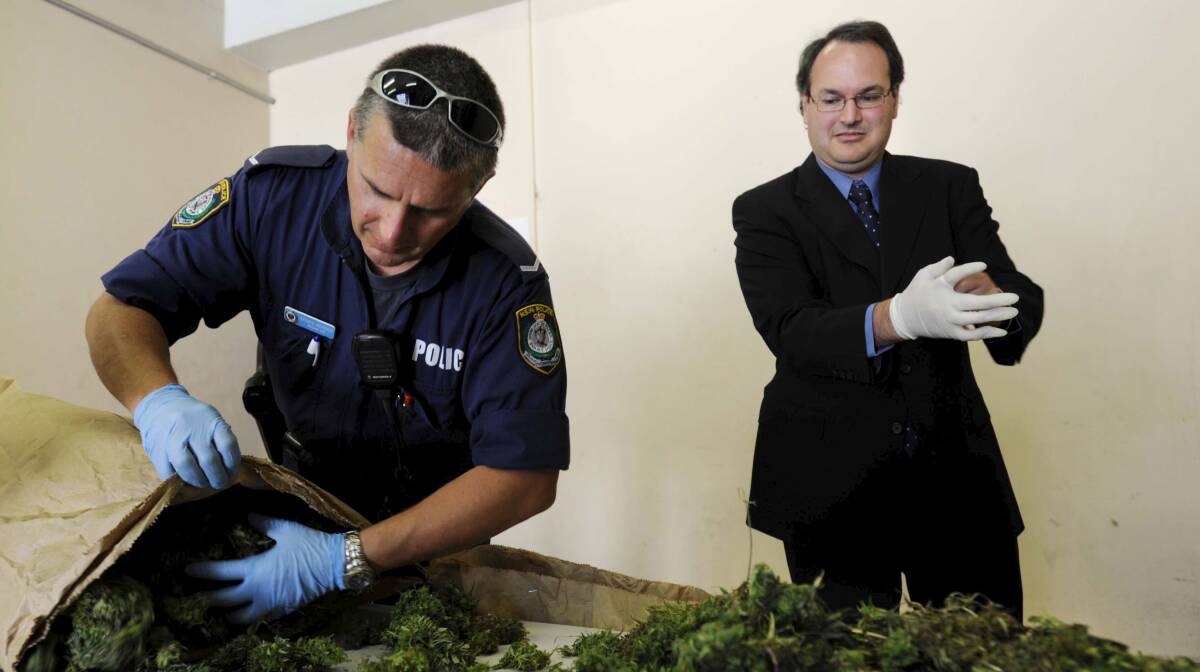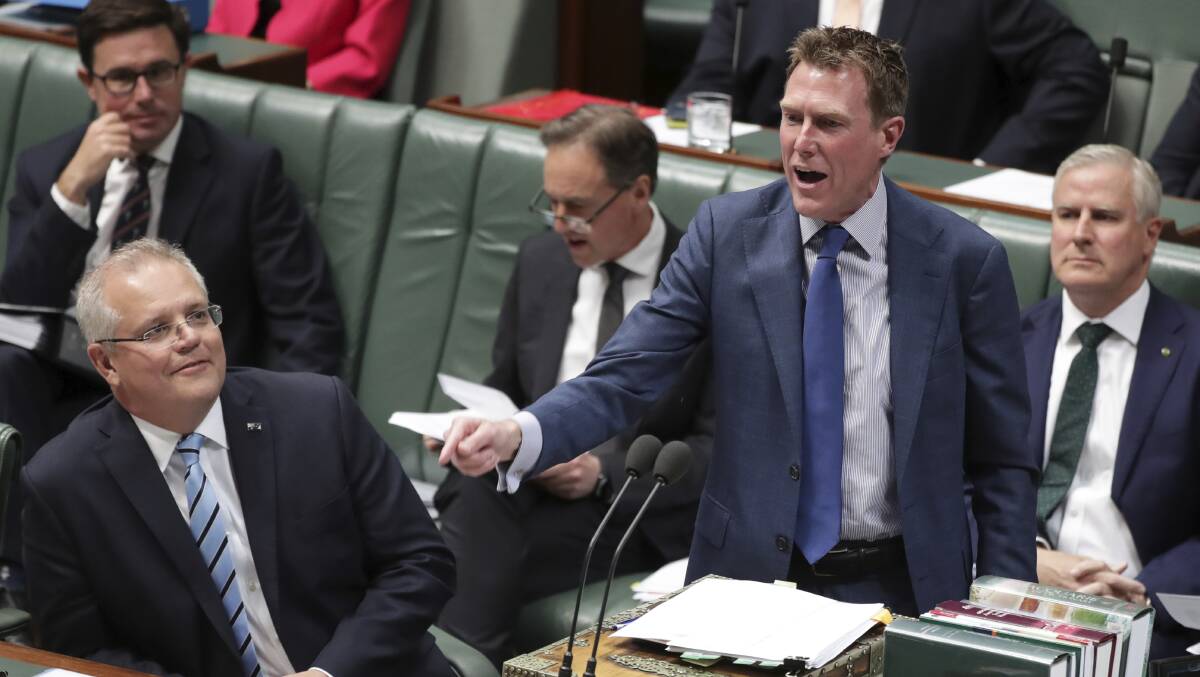Recent changes to drug laws move the ACT a step closer to legalising the possession and use of personal quantities of cannabis. Sadly, if predictably, they have caused the federal government to have a conniption.
Subscribe now for unlimited access.
$0/
(min cost $0)
or signup to continue reading
Yet the new laws represent only a minor development in the situation regarding cannabis in the ACT. For the past 30 years, "simple cannabis offences" - the possession or use of small quantities of dried cannabis or two cannabis plants for personal use - have been treated in much the same way as parking offences. They attract a fine but no criminal prosecution or record.
Similar systems are in place in both South Australia and the Northern Territory; in other states, a system of "cannabis cautions" or referrals to counselling attempt to minimise prosecutions.

The ACT amendments simply bring the law into line with the general approach of the government and the police. The new law also reflects, and is indeed less ambitious than, developments in many other countries. Recreational cannabis use was entirely legalised in Canada just last year. To present this approach as some kind of "crazy" lefty madness shows how out of touch the federal government is.
So what difference do the laws make to usage levels? According to a wealth of information from around the world, not much.
According to the Australian Government's own National Drug Strategy Household Survey 2016, 35 per cent, or almost 7 million Australians, have used cannabis, 10.4 per cent in the last 12 months. Twenty-two per cent of people in their 20s recently used cannabis. These figures have remained stable over the past decade or more (in fact, use among young people is in decline), and show very little difference between states.
The ACT has the most liberal cannabis laws in the country, even before the recent amendments. But we also have the lowest levels of illicit drug use (12.9 per cent) in Australia, and the lowest level of cannabis use (8.4 per cent) too. If the government's view is that lax laws "send the wrong message" or "promote" the use of cannabis, their own evidence suggests the contrary.
Of course there are significant health risks associated with excessive cannabis use. But most of the harms that flow from personal cannabis use are not caused by the drug at all; they are caused by the law.
Prohibition brings otherwise law-abiding people into contact with criminals and - hardly less serious - with the criminal justice system, in ways that can ruin their whole lives. It discourages users with health or mental problems from seeking the very medical help they need. And it undermines the legitimacy of the whole legal system.
What are young people to make of laws that persecute a normal social behaviour while tolerating tobacco and condoning alcohol, both of which have vastly more serious health effects? Two thirds of current smokers in Australia will die of it; but you can still buy a pack at the local supermarket.
The Attorney-General, Christian Porter, now maintains that Commonwealth laws providing severe penalties for use and possession still apply in the ACT. He states that he expects ACT police to "continue to enforce ACT and Commonwealth drug laws". Well, if anything begs the question, that does.
The Commonwealth Criminal Code provides severe penalties for drug use and possession. Those penalties already contradict the decriminalisation policy adopted by the ACT, as well as efforts to reform the law in other states. But - and it is a very big but - the Commonwealth law explicitly provides that federal drug offences do not apply if "the conduct is justified or excused by or under a law of that State or Territory".

The reason for such a law is not hard to find. In the ordinary run of things, federal law takes precedence over state or territory laws. But by and large drug laws are and always have been a state responsibility. This provision builds into the fabric of the Commonwealth's own law a clear signal that states and self-governing territories should, when it comes to drugs, be allowed to develop their own policies and practices.
A territory law protecting cannabis use by adults would seem on its face to be "justified or excused": the phrase has a legal meaning and does not imply some sort of moral argument. Commonwealth Director of Public Prosecutions Sarah McNaughton is on record as stating that anyone charged under Commonwealth law could use that section as a defence to a prosecution. That is hardly surprising.
It is not clear on what basis this advice was suddenly second-guessed by Porter's department, leading McNaughton to backtrack a week later. To what extent was political pressure brought to bear? We can only guess.
According to the Attorney-General, the difference is that the ACT law does not put in place a "positive right" to smoke cannabis. So what? The criminal law is full of examples of excuses. In some circumstances, an assault can be excused. So indeed can homicide. That does not give anyone a "positive right" to commit assault, let alone murder. Excuse and right are not the same thing.
READ MORE:
In fact, the Criminal Code goes further than the Attorney-General is prepared to admit. It offers an additional defence if "the person was under a mistaken but reasonable belief that the conduct was justified or excused". If the ACT government believes that territory law protects ACT consumers from federal prosecution - as it undoubtedly does - that would surely provide the basis for a strong defence by a user to Commonwealth prosecution.
In sum, the conflict between the two legal regimes is not in substance different from that between Commonwealth drug laws and the ACT for the past 30 years. There seems little difference to me between a law allowing for the "expiation" of minor drug offences by the payment of a fine - which then acts as a bar to criminal prosecution - and a law that simply acts as a bar to prosecution for the very same offences.
Again, a bit of perspective is in order. Cannabis arrests of "consumers" in the ACT fell by 8.7 per cent to 304 in 2016-17. The number of Simple Cannabis Offence Notices (SCONs) also fell 13.7 per cent to 82. In 2017-18, arrests were down again (295), as were SCONs (52).
Overall, there's a pattern of declining levels of enforcement and penalty when it comes to personal use. All the new law does is straighten out the troubling discretionary anomalies whereby some users receive a warning or a fine and others may find themselves arrested for the same thing. It is not an exercise in law reform - it is an exercise in legal honesty.
True, the ACT law does not cover supply, trade or traffic - whether or not money changes hands. That creates continuing uncertainties, since consumers can possess and use small amounts of cannabis but they can't legally get it from anywhere. The easiest solution would be for the police and the DPP in the ACT to come up with a sensible way to administer the law, in consultation with the ACT government.
This should be easier in the ACT than elsewhere in Australia, since territory and federal policing are undertaken by the same body. They've been dancing this tango for many years.
Subjecting personal cannabis users to the criminal law has long been understood to be against clear public policy, public health, and public opinion. Over decades, this has slowly come to be reflected in the law and in law enforcement practices.
It would hardly seem smart to change tack now, for the sake of some hollow political point-scoring.
- Professor Desmond Manderson is an expert in drug law and policy at the ANU College of Law. He is the author of From Mr Sin to Mr Big: A history of Australian drug laws.

